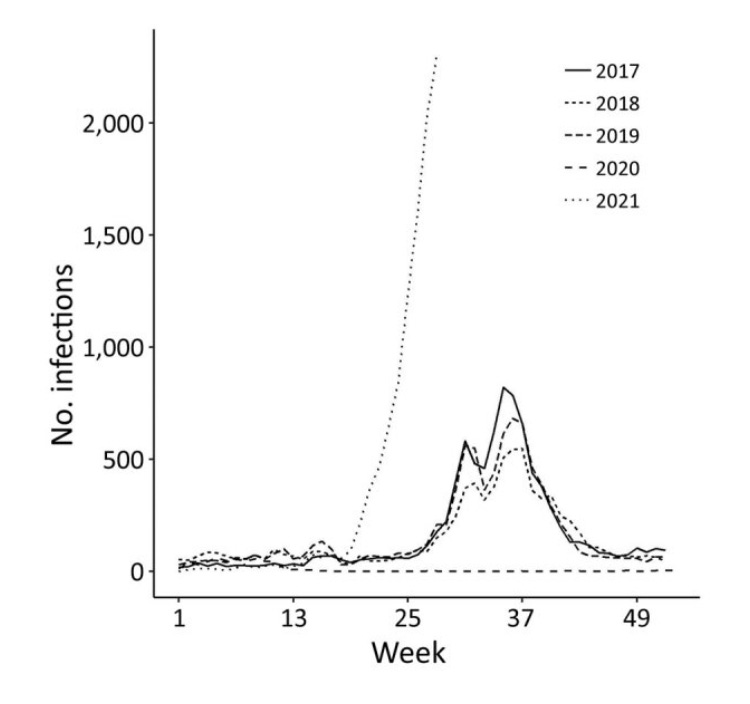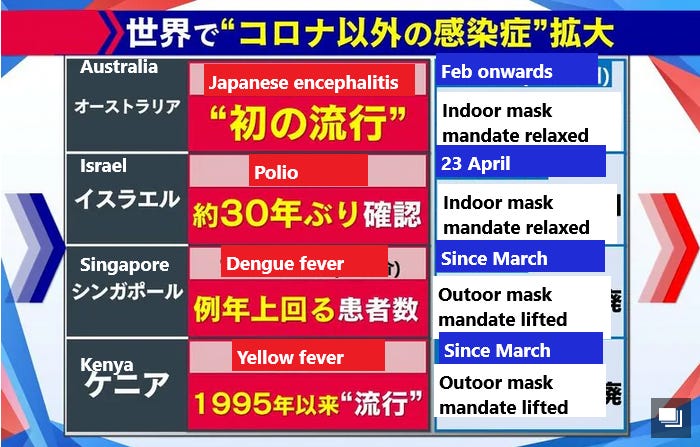After the paywalled Nikkei Business offered its readership of high IQ businesspeople a few interesting facts and opinions last week, Japanese mass-media decided it was about time to tell the masses a few interesting things too. The article discussed below is based on a TV segment that can be partially viewed here.

The article/segment start by mentioning the spread of hepatitis in children in various countries, and quotes Prof Will Irving of Nottingham University who thinks it may be because children haven’t had a chance to gain immunity to various viruses due to lockdowns and other Covid restrictions.
It also mentions the monkeypox outbreaks…
…and says the disease is spread by close contact with infected people and animals. Of course, daytime Japanese TV doesn’t sully itself by explaining what “close contact” means in this case.
Also mentioned are outbreaks of other infectious diseases in various countries.
Thankfully, even Japanese TV admits the increase in mosquito-borne diseases like dengue fever isn’t directly linked to whether or not people are wearing masks, but they suggest it could be related to the re-normalisation of life with Covid restrictions being lifted and relaxed.
Why could this be?
Back in the day, people would go out freely and unmasked to meet their friends. This led to people being exposed to viruses and other pathogens, which trained their immune systems.
But then media-driven hysteria Covid came along, so people stayed at home more, masked up, and sanitised their hands, which has led to less exposure to viruses and other pathogens, leading to weakened immune systems.
But that’s not all. According to Prof Atsushi Mizoguchi of Kurme University, if your immune system isn’t trained, it risks overreacting to viruses you encounter, which can lead to the development of autoimmune disorders and allergies.
And Prof Kunio Noguchi of the Hamamatsu Medical Center also worries that children and the elderly, who had weak immune systems beforehand, are going to suffer after not being exposed to viruses for two years. In particular, he’s concerned that influenza and other childhood diseases could spread rapidly as a result of the government telling people it’s okay to take their masks off outdoors when not talking.
In short, after telling viewers that they need to stay home, mask, and sanitise, Japanese media has finally decided to tell their loyal (and frankly credulous) viewers that they are now immunologically worse off than if they hadn’t followed this stupid advice. And it’s not like the negative health effects of masks, hand sanitizer, and social isolation weren’t sufficiently studied.
But there is one big problem with this narrative. Japan’s Covid measures (i.e., masking at all times and places and closing bars and restaurants early) haven’t actually prevented Covid or non-Covid viruses from spreading. Below is data for reported cases of RS virus in Tokyo from 2017 to July 2021 [source]. As you can see, the peak in 2021 was three times higher than in any other year.

And rhinovirus had no problem spreading in Tokyo during 2020 and 2021 either [source].

But is there anything else that has occurred recently that could possibly lead to immune suppression…
…or autoimmune disorders?
A cynic might conclude that Japanese media are priming their audience to erroneously believe that negative immunological consequences of the mRNA vaccines are in fact caused by the loosening of Covid measures. But I’m certain the media would never do that.
Oh by the way, in what I’m sure is completely unrelated news, Japan’s all-cause mortality stats for March came out this week and show a year-on-year increase of almost 16,000 (12.9%), so less bad than February. The blue and red lines are ACM for 2021 and 2022, respectively.
Deaths should hopefully be a bit lower in April.
I’m not sure about May though.















